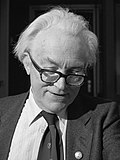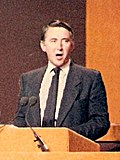| |||||||||||||||||||||||||||||||||||||
All 32 London boroughs, all 36 metropolitan boroughs, 103 out of 296 English districts and all 12 Scottish regions | |||||||||||||||||||||||||||||||||||||
|---|---|---|---|---|---|---|---|---|---|---|---|---|---|---|---|---|---|---|---|---|---|---|---|---|---|---|---|---|---|---|---|---|---|---|---|---|---|
| |||||||||||||||||||||||||||||||||||||
Local elections were held in the United Kingdom in 1982. [1] [2] The elections coincided with rising popularity of the Conservative government and Prime Minister Margaret Thatcher, which was mostly attributed to the Falklands War.[ citation needed ] The projected share of the vote was Conservatives 40%, Labour 29%, Liberal-SDP Alliance 27%.
Contents
- England
- London boroughs
- Metropolitan boroughs
- District councils
- Scotland
- Regional councils
- Notes
- References
Elections were held in several English boroughs, including all those in London.
The Conservatives held their ground, losing only 98 seats, leaving them with 10,447 seats.
The main opposition Labour Party, under the leadership of Michael Foot, lost 225 seats, finishing with 8,774 councillors.
For the newly formed Liberal-SDP Alliance, the 1982 local elections were the first nationwide electoral test. [3] They gained 395 seats and finished with 1,850 councillors. This meant that the Alliance had almost as many votes as Labour, but Labour still had nearly five times as many councillors.


